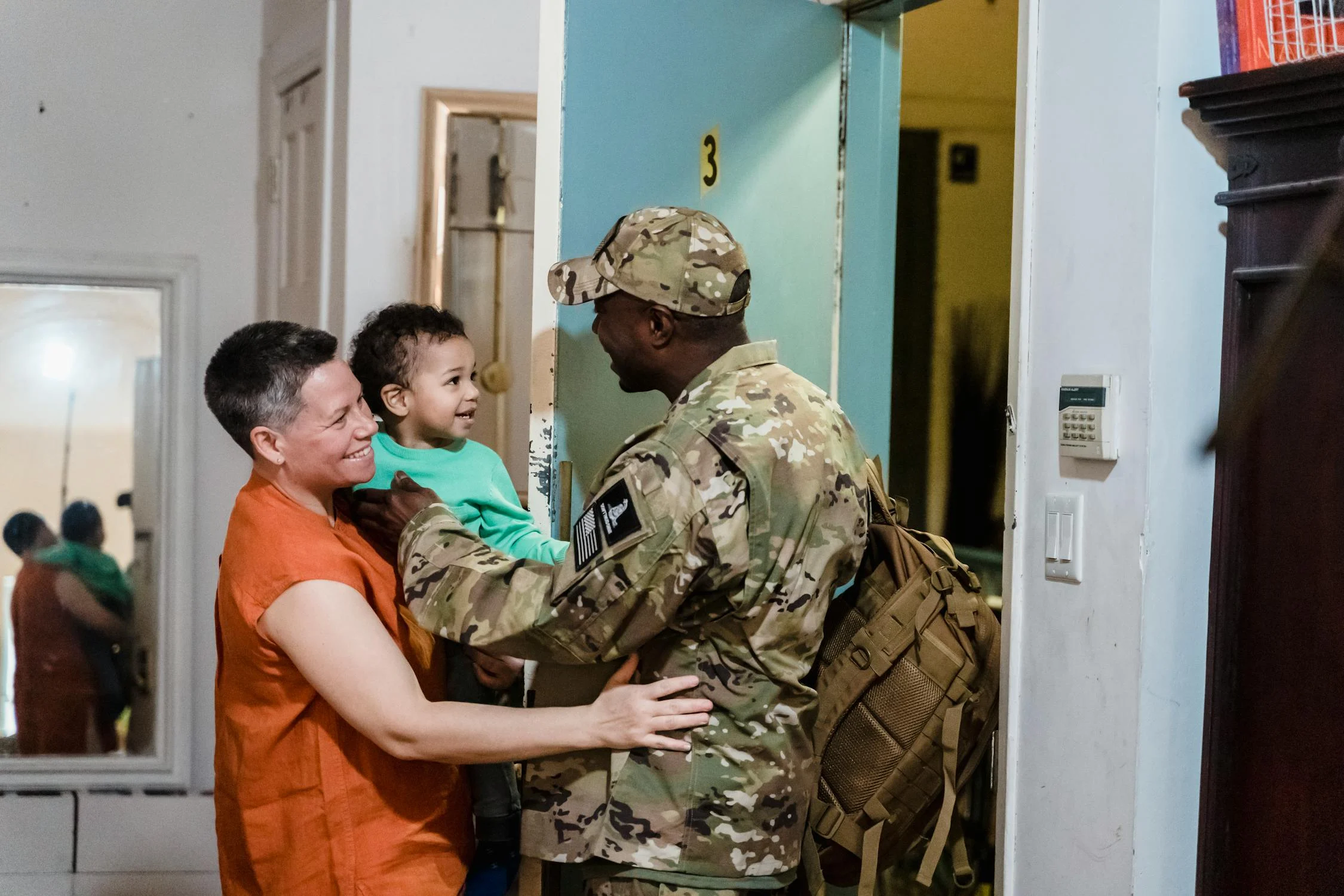The Family Advocacy Program (FAP) is a vital resource dedicated to supporting military families through the unique pressures and challenges of service life. Its mission goes beyond providing assistance; it works to prevent and respond to domestic abuse, child abuse, and neglect within military communities. Offering everything from educational workshops to immediate crisis intervention, FAP focuses on building strong, healthy relationships that keep both families and service members resilient. By fostering stability at home, the program also helps maintain the readiness and effectiveness of military personnel. Available across all branches, FAP may vary slightly in its operations, but its core commitment remains the same: to protect, strengthen, and empower military families. Here is everything you need to know about these programs.
Key Services Offered by Family Advocacy Programs
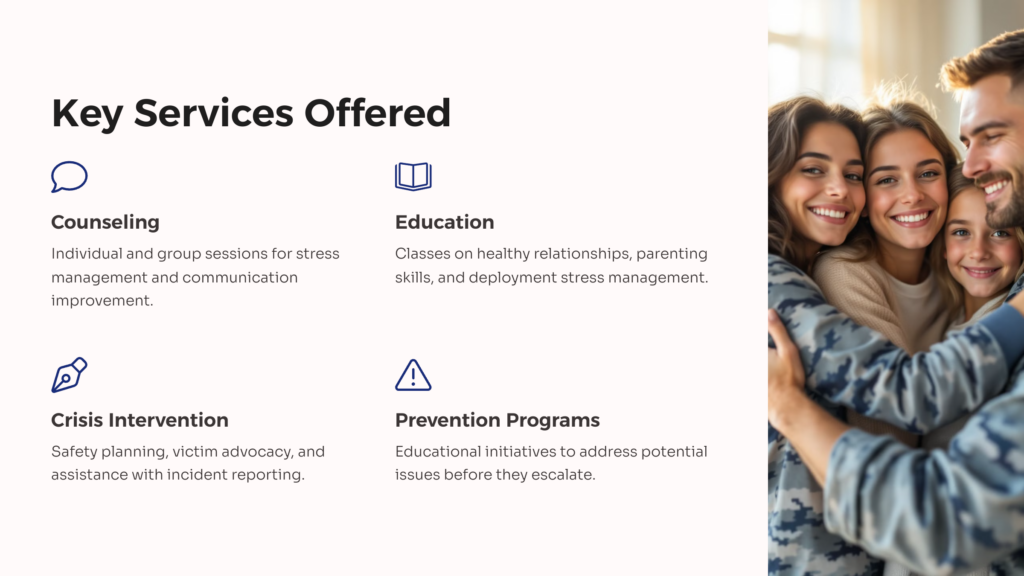
Family Advocacy Programs provide a variety of services to meet the needs of military families. These services are designed to help prevent problems before they start and to offer support when issues do arise. Here are some of the key services offered by FAP.
- Counseling: FAP offers both individual and group counseling sessions. These can help with stress management, anger management, and improving communication within families.
- Parenting: For new parents, there are special programs to help them adjust to the challenges of raising a family while serving in the military.
- Education: FAP offers classes and workshops on topics like healthy relationships, parenting skills, and dealing with deployment stress. These programs aim to give families the tools they need to build strong, resilient relationships.
- Crisis intervention services: In cases of domestic abuse or child abuse, FAP provides crisis intervention services. This includes safety planning, victim advocacy, and help with reporting incidents. The program works closely with military and civilian law enforcement to ensure the safety of victims.
The Importance of Early Intervention and Prevention
Early intervention and prevention are at the heart of the Family Advocacy Program. By addressing potential issues before they become serious problems, FAP helps maintain the health and stability of military families.
Prevention efforts include educational programs that teach healthy relationship skills, stress management techniques, and positive parenting strategies. These programs are designed to give families the tools they need to handle the unique stresses of military life.
Early intervention is crucial when problems do arise. FAP staff are trained to recognize signs of domestic abuse, child abuse, and neglect. They can step in quickly to provide support and resources before a situation escalates.
By focusing on prevention and early intervention, FAP not only helps individual families but also contributes to the overall readiness and effectiveness of the military. Healthy, stable families mean service members can focus on their duties without worrying about problems at home.
How to Report Domestic and Child Abuse
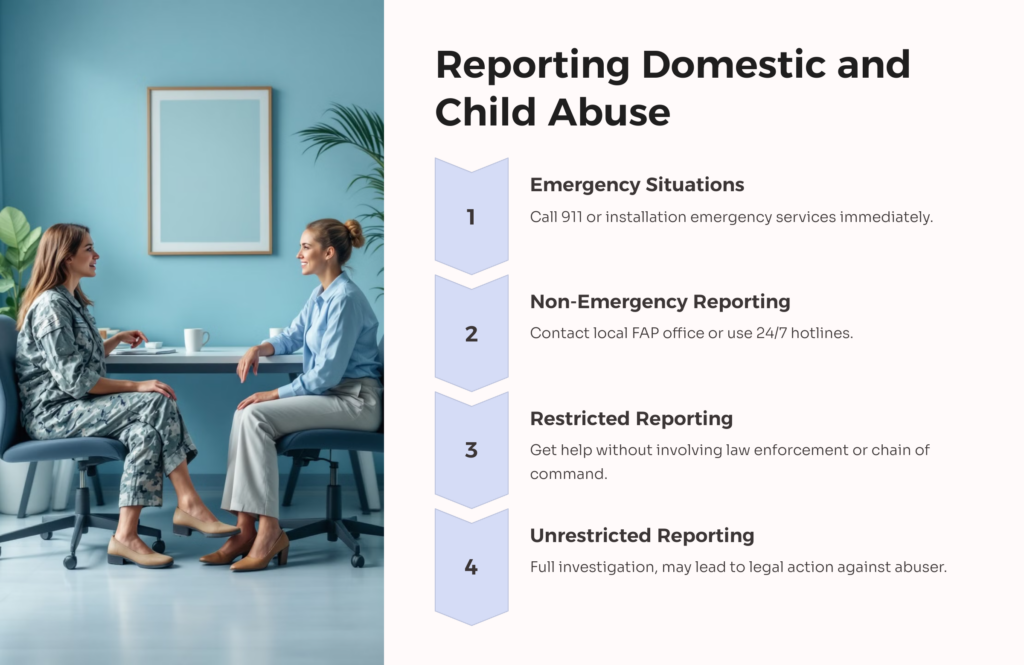
Reporting domestic or child abuse in a military setting can seem daunting, but FAP has clear procedures in place to make the process as straightforward as possible. It’s important to remember that reporting abuse can be a life-saving action.
If you’re in immediate danger, always call 911 or your installation’s emergency services first. For non-emergency situations, you can contact your local FAP office directly. Many installations have 24/7 hotlines for reporting abuse.
Military OneSource provides a comprehensive guide on how to report abuse, including contact information for each service branch’s FAP. They also offer confidential support and can help connect you with local resources.
Remember, you have options when reporting. Restricted reporting allows adult victims to get help and support without involving law enforcement or the chain of command. Unrestricted reporting involves a fuller investigation and may lead to legal action against the abuser.
Support for New and Expecting Parents
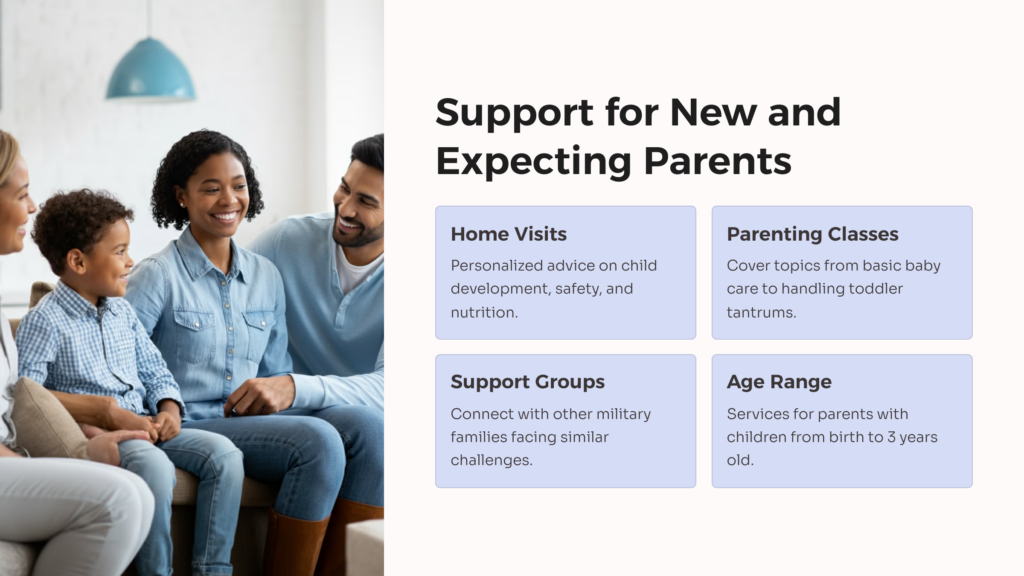
Being a new or expecting parent in the military comes with unique challenges. The Family Advocacy Program recognizes this and offers special support through the New Parent Support Program (NPSP).
NPSP provides home visits, parenting classes, and support groups for parents with children from birth to 3 years old. These services are designed to help parents cope with the stress of raising young children while balancing military duties.
During home visits, trained professionals can offer personalized advice on child development, safety, and nutrition. They can also help parents learn positive discipline techniques and ways to bond with their babies.
Parenting classes cover a wide range of topics, from basic baby care to dealing with toddler tantrums. These classes are a great way for new parents to learn skills and connect with other military families facing similar challenges.
The Role of Victim Advocates in Military Communities
Victim advocates play a crucial role in supporting those affected by domestic abuse or sexual assault in military communities. These trained professionals work within the Family Advocacy Program to provide essential services to victims.
One of the primary responsibilities of victim advocates is to offer emotional support and guidance. They listen without judgment and help victims understand their options. This can be especially important in the confusing aftermath of an abusive incident.
Victim advocates also help with practical matters. They can assist in creating safety plans, accompany victims to medical appointments or court hearings, and help navigate the military and civilian support systems. They serve as a bridge between victims and other services they might need.
The Army’s Family Advocacy Program highlights the importance of victim advocates in providing round-the-clock access to support services. This immediate availability can be crucial in crisis situations.
Eligibility and Access to Services
Family Advocacy Program services are generally available to all active duty service members and their families. This includes spouses, children, and other family members who are eligible for care in a military treatment facility.
In some cases, services may also be available to unmarried intimate partners of service members, especially if they share a child. Reserve and National Guard members may be eligible when on active duty orders.
To access services, you can usually contact your installation’s FAP office directly. Many bases have walk-in services available during business hours. For after-hours support, there are often 24/7 hotlines available.
It’s important to note that seeking help from FAP is a sign of strength, not weakness. The program is designed to support military families, and using its services does not negatively impact a service member’s career.
Confidential vs. Unrestricted Reporting: What You Need to Know
When it comes to reporting domestic abuse or sexual assault in the military, there are two main options: confidential (also called restricted) reporting and unrestricted reporting. Understanding the difference is crucial for victims considering seeking help.
Confidential reporting allows adult victims to get medical care, counseling, and victim advocacy services without triggering an official investigation. This option gives victims time to consider their choices and get help without immediately involving law enforcement or the chain of command.
Unrestricted reporting, on the other hand, activates a full investigation. This can lead to legal action against the abuser and involvement of the chain of command. While this might seem more daunting, it can also provide more comprehensive protection and support.
The Navy’s Family Advocacy Program provides detailed information on both reporting options. They stress that the choice between confidential and unrestricted reporting is entirely up to the victim.
Collaborative Efforts with Civilian Agencies
The Family Advocacy Program doesn’t work in isolation. It collaborates closely with civilian agencies to provide comprehensive support to military families. This partnership is crucial, especially for families living off-base or in areas without extensive military support services.
FAP often works with local child protective services, domestic violence shelters, and law enforcement agencies. This collaboration ensures that military families have access to a wide range of resources, both on and off the installation.
For example, if a military family needs emergency housing due to domestic violence, FAP might work with a local shelter to find a safe place. Or, if a child abuse investigation involves both military and civilian authorities, FAP can help coordinate the response.
These collaborative efforts help create a safety net for military families, ensuring that help is available no matter where they’re located or what specific needs they have.
Resources Available for Military Families
The Family Advocacy Program offers a wealth of resources to support military families. These resources go beyond crisis intervention and include tools for everyday family life and personal growth.
One key resource is the Military OneSource website. It provides information on a wide range of topics, from deployment readiness to financial planning. They also offer free, confidential counseling services to eligible service members and their families.
Many installations have lending closets where families can borrow household items, especially useful during moves or deployments. FAP offices often have libraries with books and materials on parenting, relationships, and personal development.
The Marine Corps Family Advocacy Program highlights additional resources like playgroups for young children and support groups for various family situations. These groups provide opportunities for families to connect and support each other.
Impact of Family Advocacy Programs on Military Life
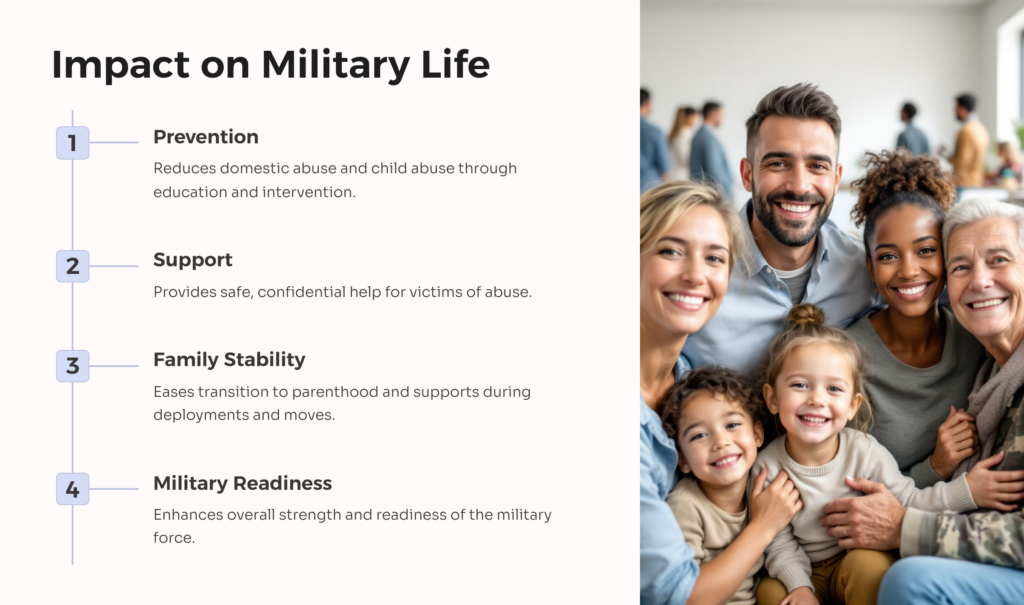
The Family Advocacy Program has a significant positive impact on military life. By providing support, education, and intervention services, FAP helps create stronger, more resilient military families.
One of the most important impacts is the prevention of domestic abuse and child abuse. Through education and early intervention, FAP helps families develop healthy relationship skills and parenting strategies. This not only improves family life but also contributes to the overall readiness and effectiveness of the military force.
FAP also plays a crucial role in supporting victims of abuse. By providing a safe, confidential way to seek help, the program ensures that victims can get the support they need without fear of negative consequences.
The program’s focus on new parent support helps ease the transition to parenthood for many military families. This support can be especially valuable during deployments or frequent moves, common challenges in military life.
Utilizing Family Advocacy Programs for the Better
The Family Advocacy Program plays a critical role in safeguarding the well-being and stability of military families. By providing resources, intervention, and education, it helps address family challenges before they escalate—allowing service members to focus on their missions with peace of mind. This support not only strengthens individual households but also contributes to the overall readiness and resilience of the military as a whole.
If you’d like to explore more about FAP and other programs that impact veterans and their families, visit us at AllVeteran.com for expert guidance and resources.
 AllVeteran.com Advisors
AllVeteran.com Advisors
With expertise spanning local, state, and federal benefit programs, our team is dedicated to guiding individuals towards the perfect program tailored to their unique circumstances.















